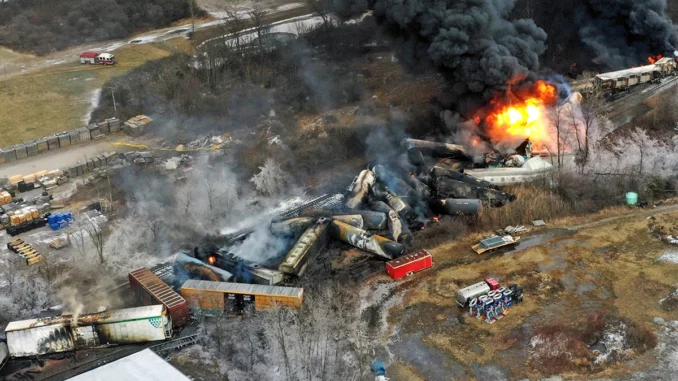
By Ben Jealous
People around East Palestine, Ohio, have been warned not to run their vacuum cleaners.
That was the reality two weeks after a train derailment in the village of about 4,700 people near the border with Pennsylvania that damaged public health and the environment in ways that still aren’t fully known.
Pennsylvania’s health department has told residents that data from its air quality monitoring “do not indicate a potential for long-term health effects,” but if people choose to vacuum after their evacuation they should do so “small amounts at a time and take frequent breaks by walking outdoors.” As confusing as those messages may be, Ohioans have gotten even less information from that state’s government.
Five of the derailed cars contained nearly 1 million pounds of vinyl chloride, a toxic flammable liquid; other cars carried butyl acrylate, ethylhexyl acrylate, and isobutylene. The spills from the wreck have left a long chemical plume moving down the Ohio River at about a mile an hour. The result has been at least 3,500 fish killed. The train’s owner Norfolk Southern said it is removing contaminated soil at the crash site, which can leach toxic chemicals into the water and air, after the Environmental Protection Agency (EPA) raised questions.
The immediate need is to respond to make sure that harm to people, wildlife, and waters now and in the future are limited to the extent we are able. As a starting point, residents need clear, understandable answers about risks they face and support to which they are entitled. While federal authorities generally defer to state officials in disasters, the simmering mistrust caused by the strange odors residents say they smell, the soreness of their throats, and the aching in their heads seems to cry out for a different response.
The EPA and Transportation Department must ensure that Norfolk Southern meets its obligation to make things right. The Sierra Club’s Ohio director Ericka Copeland captured it – “East Palestine and the surrounding communities in Ohio and Pennsylvania deserve full transparency from the EPA, Norfolk Southern, and state leadership…Residents deserve to be able to safely return to their homes and access drinking water without the risk of everyday activities like vacuuming exposing them further to these chemicals.”
Moving forward, we need to do more to protect people and places from hazardous materials that move in more than 2 million freight cars each year. To be fair, reports show that freight rail spills happen less often than spills from trucks or planes. But we know those trains don’t run through posh suburbs. They run through places like East Palestine, a working-class White village where median household income is about two-thirds the Ohio average. They are places that historically get overlooked.
The best news is we already know what to do. While the cause of the Ohio derailment hasn’t been determined officially, reports indicate a wheel bearing in the car that caused the accident overheated; there are sensors for that we can require. Similarly, we can replace braking technology that dates back more than a century with newer brakes that even Norfolk Southern said cuts stopping distances by 60 percent.
Anyone who saw videos of the burning cars after the crash or the huge cloud of smoke when vinyl chloride was burned off to prevent an explosion may shocked to learn that the wrecked train wasn’t designated a “high-hazard flammable train,” which would trigger additional safety steps and more notice to state and local officials. This is an easy step to take.
These remedies have been proposed before. The railroad industry calls them too costly. But that claim must be weighed against nearly $200 billion in stock buybacks and dividends for the nation’s biggest rail companies since 2010 as they also cut their workforces.
We can start by restoring brake system and other safety rules rescinded during the Trump administration. Once we push for all these common-sense measures to protect ourselves and our neighborhoods, we should start asking another question – what was going to happen to all those toxic chemicals once they reached the railyard where they were headed?
Ben Jealous is incoming executive director of the Sierra Club, the oldest and most influential grassroots environmental organization in the country. He is a professor of practice at the University of Pennsylvania and author of “Never Forget Our People Were Always Free,” published in January.
EPA Orders Norfolk Southern to Conduct All Cleanup Actions Associated with the
East Palestine Train Derailment
EPA order comes as state-led emergency response transitions to environmental cleanup phase; EPA will continue to work with local, state, and federal partners to ensure the health and safety of East Palestine community
The U.S. Environmental Protection Agency (EPA) ordered Norfolk Southern to conduct all necessary actions associated with the cleanup from the East Palestine, Ohio, train derailment. As part of EPA’s legally binding order, Norfolk Southern will be required to:
- Identify and clean up contaminated soil and water resources.
- Reimburse EPA for cleaning services to be offered to residents and businesses to provide an additional layer of reassurance, which will be conducted by EPA staff and contractors.
- Attend and participate in public meetings at EPA’s request and post information online.
- Pay for EPA’s costs for work performed under this order.
As part of the order, EPA will approve a workplan outlining all steps necessary to clean up the environmental damage caused by the derailment. If the company fails to complete any actions as ordered by EPA, the Agency will immediately step in, conduct the necessary work, and then seek to compel Norfolk Southern to pay triple the cost.
“The Norfolk Southern train derailment has upended the lives of East Palestine families, and EPA’s order will ensure the company is held accountable for jeopardizing the health and safety of this community,” said EPA Administrator Michael S. Regan. “Let me be clear: Norfolk Southern will pay for cleaning up the mess they created and for the trauma they’ve inflicted on this community. I’m deeply grateful to the emergency responders, including EPA personnel, who’ve been on the ground since day one and ensured there was no loss of life as a result of this disaster. As we transition from emergency response, EPA will continue to coordinate closely with our local, state, and federal partners through a whole-of-government approach to support the East Palestine community during the remediation phase. To the people of East Palestine, EPA stands with you now and for as long as it may take.”
To address the concerns of residents regarding potential indoor contamination, EPA will offer cleaning services to area businesses and families. The Agency has extensive experience with similar cleaning programs in other Midwestern communities. Under the terms of the order, Norfolk Southern will reimburse EPA for the costs of these cleaning services. More details about how community members can request this service will be available this week.
EPA’s order marks the transition of the multi-agency response from its “emergency phase” to a longer-term remediation phase. To help implement the order, EPA will establish a “unified command structure” to coordinate the clean-up related efforts of FEMA, HHS, Ohio EPA, Ohio EMA, PA DEP, as well as Norfolk Southern. This approach is frequently used in situations where multiple agencies need to work together. In this case, the response includes federal, state and local agencies across multiple states.
As soon as EPA was notified of the Norfolk Southern train derailment on Friday, February 3, EPA personnel were on-site by 2 a.m. Saturday morning to assist with air monitoring. Since then, EPA has been boots-on-the-ground, leading robust air-quality testing – including with the state-of-the-art ASPECT plane and a mobile analytical laboratory – in and around East Palestine.
EPA has assisted with indoor air monitoring of more than 550 homes under a voluntary screening program offered to residents, and no detections of vinyl chloride or hydrogen chloride were identified above levels of concern. EPA is continuing to provide screening to all residents within the evacuation zone.
More information about EPA’s ongoing response to the East Palestine train derailment is available on EPA’s website: https://response.epa.gov/EastPalestineTrainDerailment.







